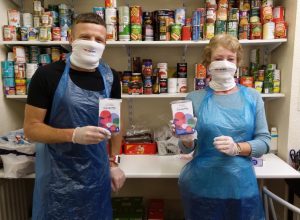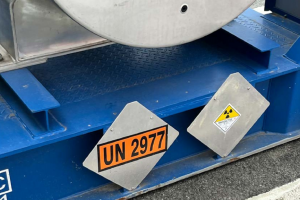Coronavirus business update: Latest news across the North West

Southport Business Improvement District (BID) is behind a scheme to help stimulate the local economy which has been badly affected by the coronavirus pandemic.
The seaside resort is participating in a new gift card programme in association with Scottish tech firm Miconex.
More than 60 retailers and local stores have registered so far, and the aim is to increase this to 150.
Cards can be purchased with a value of £10-£500 as gifts with the recipient able to use the card like a debit card across multiple outlets.
Data from the ONS shows that 60% of businesses in the North West reported a decrease in turnover in June and July 2020.
This compares with 58% in Wales, 57% in England generally, and 54% in Northern Ireland.
Sectors particularly affected include arts, entertainment, recreation, accommodation and food service.
Southport BID chief executive, Rachel Fitzgerald, said: “Credit on the Southport Gift Card will be redeemable through multiple transactions at participating businesses within the Southport BID area.
“We want the card to help drive local spend and a ‘shop local’ message. Our focus is firmly set on helping our local businesses in Southport to recover from this COVID crisis. We are doing everything we can to help our town.”
::

Volunteers, Mark and Mag, from Chorley-based Help the Homeless
Chorley-based healthcare product manufacturer, Vernacare, has pledged its support to the community by donating specially made face coverings to local charities.
The manufacturer of infection control systems has produced a limited number of face coverings with the same, innovative fabric it uses to make tubular bandages.
Manufactured using high quality, durable yarns and Vernacare’s multiStretch technology, the face coverings are lightweight, breathable and do not irritate the skin.
The company has pledged more than 500 face coverings to a number of charities across Chorley and Bolton including Help the Homeless, Storehouse Pantry, Four Paws Dog Rescue, Mental Health Independent Support Team, Inspire Youth Zone and OnSide Youth Zone.
Chief executive, James Steele, said there had been high demand for their products after guidance from the World Health Organisation stipulated that all healthcare facilities use single-use and disposable products.
“We are extremely proud to have been supporting frontline healthcare workers during the pandemic and, as people try to navigate through the new normal, we wanted to do even more and give something back to charities in our local communities,” he said.
“We looked at how our existing materials could be used to make face coverings and the fabric used in our tubular bandages seemed to be the perfect fit.
“We have evolved our manufacturing processes to create the new face coverings and a limited number have gone into production.
“We have already given these face coverings to our staff, suppliers and customers and have had great feedback, so we hope they will help charity volunteers carry on with their important work in the local community.”
Vernacare has increased production by more than 60% during the past few months to produce disinfecting wipes, disposable bedpans and urinals as well as hospital macerators to dispose of waste safely.
The teams have worked round the clock to distribute vital supplies across the UK and to over 50 countries — among one of the first orders was a consignment of disinfectant wipes sent to Wuhan, China, where the virus was first detected.
::

Joanna Swash
A survey by Wrexham-based outsourced communications provider, Moneypenny, into the return to work post-COVID lockdown, shows that almost half (46%) of office workers surveyed in the North West are returning to work immediately, with a further 31% due back in the next one to four months.
However, workers in the North West were more concerned about the risks of returning to work than are those in others parts of the UK, with 62% admitting to having some concerns about COVID risks, compared with the national average of 48%, and a further 22% are not at all comfortable about going back to the office, compared with the national average of 15%.
For some workers in the region the return to work has been further delayed, with five per cent not required to return to work until January 2021 at the earliest, and 15% having no specific date to return.
A reluctance to use public transport is shown in the fact that only 11% of those surveyed in the North West will use it to commute, while 68% will use their car. In contrast, 53% of those in London will commute by car.
In a blow to those hoping returning workers will boost the local economy, the survey showed more than 44% of those in the North West said they won’t be visiting any local amenities when they go back to work, compared with the national average of 36%.
The survey also showed that 67% of workers in the North West said their company has made masks compulsory, of which 27% require them to be worn at all times, in all areas, while 40% require them to be worn only in communal areas. A further 21% said their company has made masks voluntary and they plan to wear one, while 13% said they are voluntary but they won’t wear one.
Social distancing at work is clearly a concern, as 13% of North West workers surveyed said they don’t trust their colleagues to social distance in the office and would keep an eye on them and report them to the management if necessary, while 45% trust some, but not all their colleagues.
Some offices have banned the sharing of equipment completely, according to 34% of those surveyed in the North West, while even without a ban, a further 32% said they won’t be sharing stationery and equipment with colleagues.
Even the tea rounds have been called into question. While 47% of North West workers said they will make teas and coffees for their colleagues, 42% will only make tea for themselves and 11% said their companies have banned tea rounds.
Joanna Swash, Moneypenny chief executive, said: “We were interested to see how many office workers are either already back at work or will be going back in the next few months.
“While there is inevitably nervousness about COVID risks, it is positive to see the large proportion of people who are happy to work with their company in following the new health and safety rules and we’ve certainly been impressed by how innovative and agile our own clients have been in adapting to the new normal at work.”








